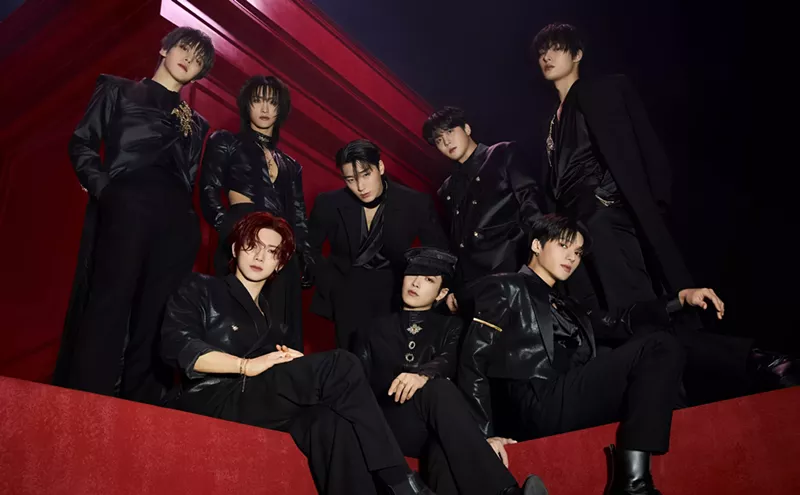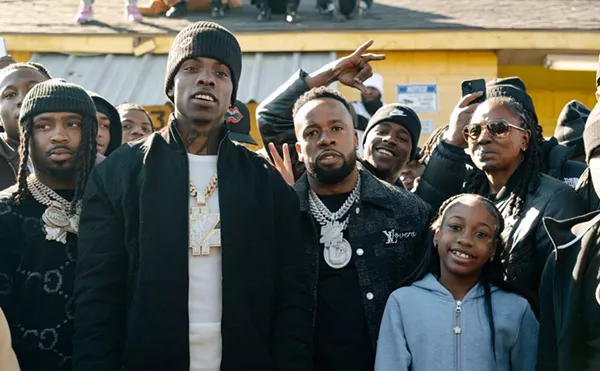Or who knows? Maybe that doesn't explain anything. Superchunk singer-guitarist Mac McCaughan stopped trying to figure it out a long time ago.
"Our crowd has always been a pretty mixed bag of, like, super-young fans who are just hearing about the band and people who have sort of been following us the whole time, who are consequently as old or older than we are," McCaughan says. "So it's a pretty big mix. In terms of numbers, I mean, it has been sort of growing, every year, or every tour, whatever. Which is strange, because record-sales-wise, you know, our biggest-selling record was probably a few records ago. At this point, they still do well, but they've leveled off. It's a shame, because I like playing live, but touring is pretty hard and pretty grueling and stuff like that, and you want people to hear the records. It would be great if they'd pick up the records as well."
There may be another reason why they're not picking up the records. If you've never heard a Superchunk album before, listening to its latest, Here's to Shutting Up, is a bit like picking up a comic book in the middle of its run; you can follow the story, maybe, probably, but the characters aren't very familiar. It can be daunting, going to a record store and seeing so much back story there: eight albums (including Here's to Shutting Up) and a pair of singles compilations (1992's Tossing Seeds: Singles 1989-91 and 1995's Incidental Music: 1991-95), as well as a plastic tower of EPs and singles. With a discography that runs a full page, single-spaced, you might be inclined to give up before you start. But you shouldn't.
It's worth mentioning that, by now, you're either for Superchunk or against it, and if you haven't made up your mind yet, you probably never will. At this point, more than a decade later, there is little about the band you do not know if you're a fan and not much to convince you to find out more if you're not. A few years ago, maybe around the time of 1994's Foolish or the following year's Here's Where the Strings Come In, people could excuse their absence by saying Superchunk had fallen through the cracks or was flying under the radar or whatever euphemism explained why they weren't paying attention. Now, however, you can look at it this way: If a television show is on for 10 seasons and you don't watch a single episode, well, it's probably not an accident.
"I mean, you always want to sell more records and reach a wider audience," drummer Jon Wurster said in a 1999 interview with the Dallas Observer, just after the release of Come Pick Me Up. "I think we're coming to the conclusion now that that probably isn't going to happen, and that might not be such a bad thing."
That doesn't make it right, though. In a perfect world, one not owned and operated by a handful of white guys, Superchunk's "Slack Motherfucker" would be a part of every modern-rock radio station's bringing-in-the-weekend shindigs, and kids would dress up like McCaughan for Halloween. Everyone would already know that McCaughan and bassist Laura Ballance run Merge Records, the Chapel Hill, North Carolina-based label that started when the band did (1989) as an outlet for the group's first singles. And since then, Merge has released records by bands such as the Magnetic Fields, Neutral Milk Hotel, Spoon, Rocket From The Crypt and The Wedding Present, to name but a few, as well as every Superchunk album since Foolish.
Everyone would also know that McCaughan and Ballance, along with Wurster and guitarist Jim Wilbur, have spent the last 10 years making the kind of music that--along with, say, Guided by Voices--defines the term indie rock. Since 1997's Indoor Living, the group has expanded its own definition, making room in its three-chord rock for keys and cellos and horns and whatever else is around. On Indoor Living, as well as on Come Pick Me Up and Here's to Shutting Up, they've found a musical maturity that isn't just a nice way of saying boring.
You need only listen to Shutting Up's first two songs, "Late-Century Dream" and "Rainy Streets," to hear how Superchunk has grown older without growing too far away from what made it important in the first place. "Late-Century Dream," with its strings and things, glides from verse to chorus and back, the mood spooning with the message ("everybody's trying to make space around what they think they've got"). "Rainy Streets," then, is the wake-up call, a prototypical No Pocky for Kitty-era Superchunk song that even says as much ("the fire's the same that's been around"), all trebly guitars and rushed rhythms and McCaughan's breathless, breathy voice. The album could end after those two songs and it would be just as satisfying.
While there are a few other songs that sound like standard-issue Superchunk tunes ("Out on the Wing," "Art Class (Song for Yayoi Kusama)") on Here's to Shutting Up, the album's title could be taken quite literally. It's not necessarily a quiet record, but it is softer, less a sprint to the finish line than a victory lap, a tour of past glories with room in between to reflect. There's a subtlety present that most people who have heard Shutting Up may have missed, McCaughan says. It's quiet at times, yes, but it serves a purpose.
"It's funny, because the reaction has been so, like, 'Ohmigosh, this record is so quiet,' and all this stuff," he says on the phone from his North Carolina home. "But there's some really typically loud songs on there. Even within the new record, there's plenty of variety, which I think, really, over the last four records, one of the things we've tried to do with each record is achieve a bigger sense of dynamics. More space. I think if you have the quieter songs, it allows the louder songs to be that much more effective and vice versa."
That approach served the band well on Come Pick Me Up, and it works even better on Here's to Shutting Up. And as on Come Pick Me Up, all the songs started in Wilbur's garage. Every note in those sessions was recorded, and by the time they came out, the new album was ready--all of it, from the simplest chord to the grandest gesture. It was a familiar way of working on a record and a brand-new one as well.
"We'd go back and listen to the discs of the stuff that we'd recorded, sift through it and put things together, throw lots of stuff away," McCaughan says. "It was a little bit more organized, in that respect, and like I said, more rigorous with what we were tossing out and stuff. The other thing that was different about this was that the material that we were working with in writing the songs, there was a little bit more stuff that we had laid out in the practice space, like keyboards and acoustic guitars and stuff like that. The basic ideas that we were coming up with, some of them were mainly written on the organ or on acoustic guitars and stuff like that, whereas the last record, it was pretty much electric guitars, a sort of more standard setup."
Writing with acoustic guitars and on the organ opened up the band to a different sound and opened up the sound as well. As McCaughan says, it was like speaking in a new language. It's not possible to say exactly the same things.
"I think that any time you pick up a new instrument, it's going to lead you in a direction that you hadn't planned on," McCaughan explains. "Even if you picked up three different electric guitars, the way they play and the way they sound sort of, I think, direct you in a different way. Whereas if you're writing everything on the same guitar all the time, then I think the direction you go in is going to be a little bit narrower. I think it definitely affects what the final results are."
The final results mark a new chapter in Superchunk's already long story. But not just in the studio. The softer--and yes, quieter--songs on Here's to Shutting Up change the way Superchunk plays live as well. In a good way. Now, instead of living from one chord to another, the group can choose from its weighty catalog of songs without the danger of having them bleed into each other. McCaughan knows that being quiet is sometimes better than being loud when you're in a band, that you can say just as much, if not more, with a whisper instead of a scream. So, here's to shutting up.
"Our shows have been getting a little bit longer over the last few years," McCaughan begins. "I mean, largely because we've got so many more songs to choose from now; you know, we try to write a set every night that encompasses more than one record and more than one sort of vibe or whatever. The longer our sets have become, I think in some ways, the more need there is for quiet songs and some space in the set, where it's not just constant bashing. There are bands that I like that, when you go see them live, it's pretty much just a steady barrage of volume, but a band like that, I don't really want to watch them for more than 35 minutes or something like that." He laughs. "I like the idea of being able to play a longer set and having there be some sort of flow to it, and having these different types of songs to work into the set really helps us have a better show, really."












